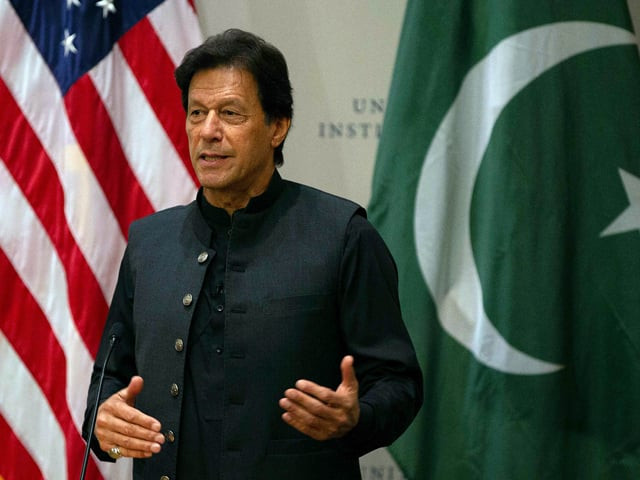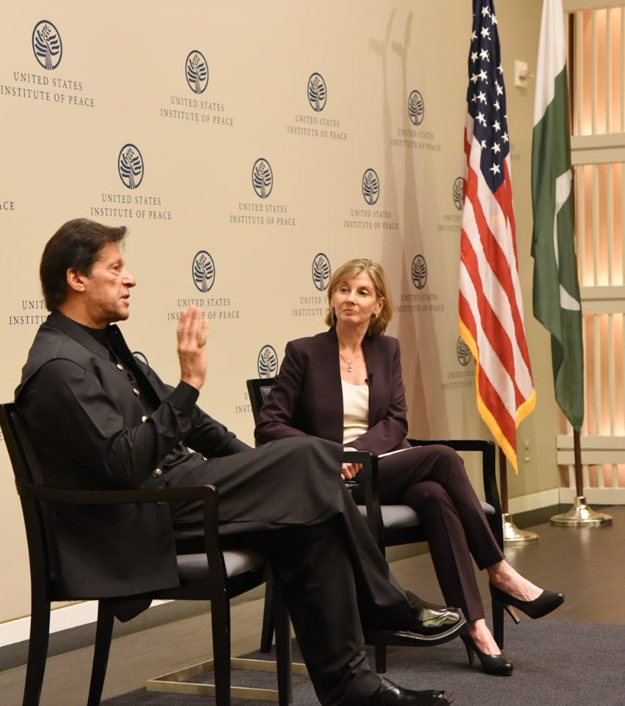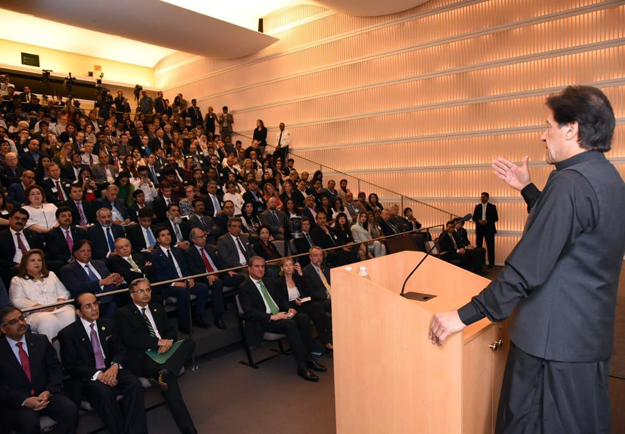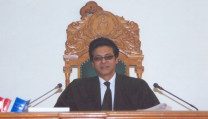PM Imran wants Pakistan-US ties ‘based on mutual trust’
Speaking at US Institute of Peace, premier vows to pursue Taliban for peace negotiation with Afghan govt

PM Imran wants Pakistan-US ties ‘based on mutual trust’
Prime Minister Imran Khan on Tuesday expressed the desire to establish unconditional bilateral relations between Islamabad and Washington based on mutual trust and friendship.
“We would like to have a relationship based on mutual trust, as equals, as friends and not as before when Pakistan wanted aid and in return it was asked to perform certain tasks for the US,” said the prime minister while speaking at the United States Institute of Peace on the last day of his three-day maiden visit to Washington.
“I am happy to leave the US now, as we have relationship based on mutual interest, which is peace in Afghanistan,” he added.
Prime Minister Imran said that he hated the idea of asking for funds not just from the US but from any other country. “Because, aid has been one of the biggest curses for my country… what it has done is, it has created the dependency syndrome,” he remarked.
“When I returned home from Saudi Arabia, everybody asked what have you got from there, as if I went there asking for money… and I think it’s humiliating for a country. Countries rise because of self-respect and self-esteem and no country rise by begging for money.
“I would like to have dignified relationship with the US, where never again should we have this humiliating phase… I can tell you as a Pakistani, never did I feel more humiliated when Osama bin Laden was taken out in Pakistan by the US troops.
“We want to have a relationship of friendship... and doesn’t really matter you know as one friend can be rich and the other can be not that rich, but so what… it’s all about dignified relationship. That’s what I hope to have from here.”

The premier also reiterated the desire to have friendly relations with all immediate neighbours of the country including India.
He said that his Pakistan Tehreek-e-Insaf (PTI) government reached out to all neighbouring countries to iron out differences and rebuild confidence to establish better trade ties after coming into power last year.
Commenting on the Afghan peace process, Prime Minister Imran vowed that he would try to pursue the Taliban to come to the negotiation table after returning from Washington.
He said that a Taliban delegation wanted to meet him a few months back but he did not because of opposition from the Afghan government. “Now I will meet the Taliban and I will try my best to get them to talk to the Afghan government,” he said, adding that he has gained their trust for professing right from the first day that the issue could only be resolved through dialogue.
The US and the Taliban are getting closer to a deal that is expected to be centered on a US pledge to withdraw troops in exchange for a Taliban promise not to let Afghanistan be used as a base for terrorism.
However, the Taliban have refused to negotiate with President Ashraf Ghani’s government, denouncing it as a US puppet, but in an effort to foster Afghan reconciliation, a 60-strong delegation of citizens met the Taliban for two days of talks in Qatar from Sunday.
Afghan government forces mistakenly killed seven civilians, including children, in an attack on militants south of the capital, a provincial official said on Monday, the latest victims of a war undiminished by peace talks.

The prime minister started off the address by narrating his life’s struggle from cricketing days to becoming a social worker and building a cancer hospital and how he formed his political party 23 years ago after realising that the country’s sufferings would not finish just by doing social work.
Prime Minister Imran said Pakistan was the fastest growing country in the region in the 1960s. But, like other colonial countries, corruption held it back after the mid-1980s.
He said his movement for justice party only started to take shape about seven years back following massive public rallies throughout the country before the 2013 general elections.
He said massive fiscal deficit and corruption remained the two biggest challenges for his government after coming into power in the last year’s polls. He blamed the last two governments of Pakistan Peoples Party and Pakistan Muslim League-Nawaz for the country’s crippling economy.
“Money which should have been used for public welfare, laundered to foreign countries by the corrupt rulers. In order to take the money out, these political elite destroyed state institutions,” he maintained.
“I felt that I was fighting with a mafia, which has been termed as ‘Sicilian mafia’ by the Supreme Court as well.”
The prime minister gave credit to his election victory to the country’s youth, saying that over 60 per cent of the country’s population consisted of youth, who became his biggest support. “Without social media we wouldn’t have beaten these political mafia parties,” he added.
Commenting on the rising inflation and rupee’s down-slope against dollar, Prime Minister Imran said his political opponents spread ‘fake news’ about the country’s economy and that the IMF wanted rupee at a certain value. “We nearly ran out of dollars. Now things are stabilising because of our hard work,” he maintained.
“We are also fixing taxation system. Without expanding tax net, no country can progress. It’s imperative that every Pakistani pays taxes.”
Blaming former rulers – Nawaz Sharif and Asif Zardari – for increasing the country’s external debt in the last 10 years, he said Pakistan’s total debt in 60 years was Rs6 trillion after Pervez Musharraf’s government, which was increased it to Rs30 trillion in the last 10 years. “They burdened the country with Rs24 trillion through looting and plundering,” he added.
With additional input from Reuters



















COMMENTS
Comments are moderated and generally will be posted if they are on-topic and not abusive.
For more information, please see our Comments FAQ